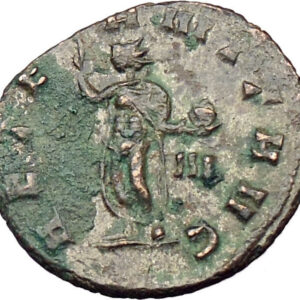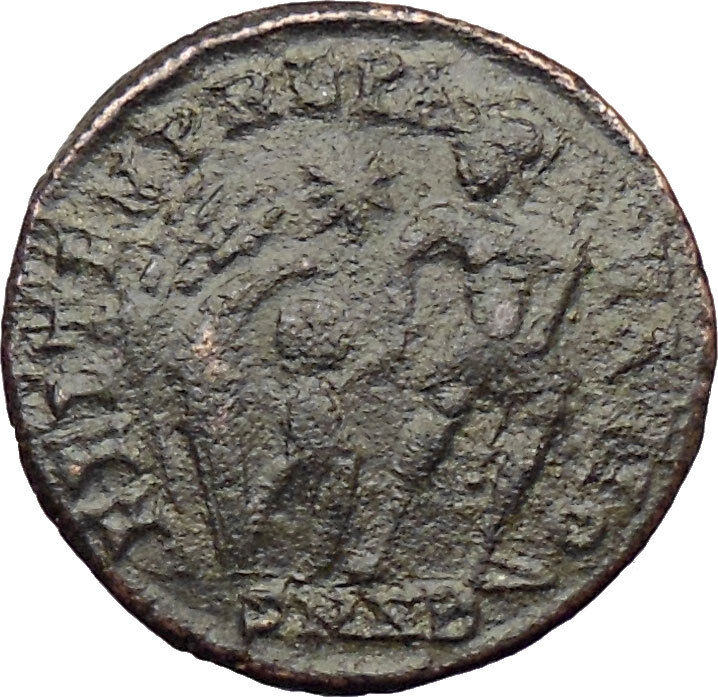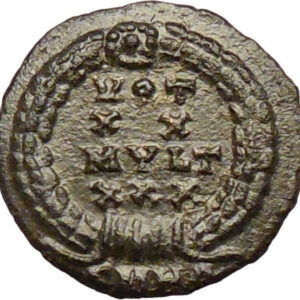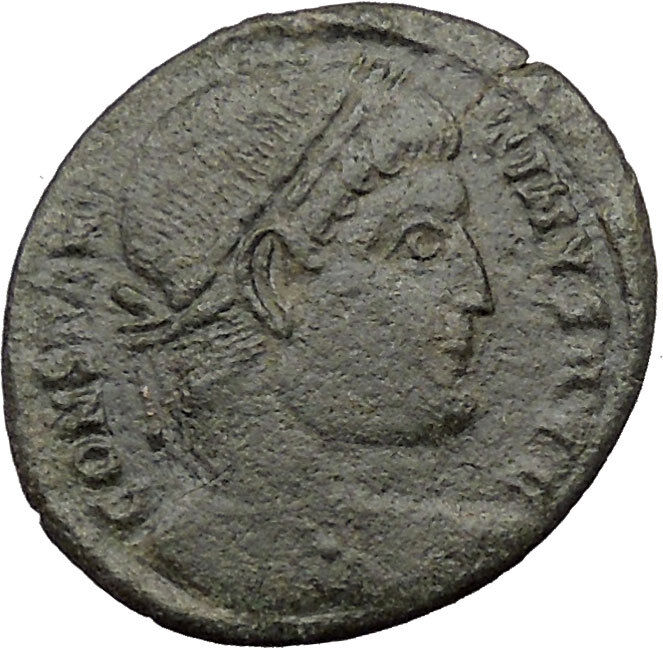|
Antoninus Pius
–
Roman Emperor
: 138-161 A.D.
Father of Marcus Aurelius
Bronze As 29mm (10.79 grams) Struck circa 138-161 A.D.
Reference: Possibly Unpublished
Laureate head right
P M TR POT COS II S-C, Pax standing left, holding branch and cornucopia.
You are bidding on the exact
item pictured, provided with a Certificate of Authenticity and Lifetime
Guarantee of Authenticity.
The cornucopia (from Latin cornu copiae) or horn of plenty
is a symbol of abundance and nourishment, commonly a large horn-shaped container
overflowing with produce, flowers, nuts, other edibles, or wealth in some form.
Originating in
classical antiquity
, it has continued as a
symbol in
Western art
, and it is particularly associated
with the
Thanksgiving
holiday in
North America
.

Allegorical
depiction of the Roman
goddess
Abundantia
with a cornucopia, by
Rubens
(ca. 1630)
In Mythology
Mythology
offers multiple
explanations of the origin
of the cornucopia.
One of the best-known involves the birth and nurturance of the infant
Zeus, who had to be hidden from his devouring father
Cronus
. In a cave on
Mount Ida
on the island of
Crete
, baby Zeus was cared for and protected by
a number of divine attendants, including the goat
Amalthea
(“Nourishing Goddess”), who fed him
with her milk. The suckling future king of the gods had unusual abilities and
strength, and in playing with his nursemaid accidentally broke off one of her
horns
, which then had the divine power to
provide unending nourishment, as the foster mother had to the god.
In another myth, the cornucopia was created when
Heracles
(Roman
Hercules
) wrestled with the river god
Achelous
and wrenched off one of his horns;
river gods were sometimes depicted as horned. This version is represented in the
Achelous and Hercules
mural painting
by the
American Regionalist
artist
Thomas Hart Benton
.
The cornucopia became the attribute of several
Greek
and
Roman deities
, particularly those associated
with the harvest, prosperity, or spiritual abundance, such as personifications
of Earth (Gaia
or
Terra
); the child
Plutus
, god of riches and son of the grain
goddess Demeter
; the
nymph
Maia
; and
Fortuna
, the goddess of luck, who had the power
to grant prosperity. In
Roman Imperial cult
, abstract Roman deities who
fostered peace (pax
Romana) and prosperity were also depicted with a cornucopia,
including Abundantia
, “Abundance” personified, and
Annona
, goddess of the
grain supply to the city of Rome
.
Pluto
, the classical ruler of the underworld in
the
mystery religions
, was a giver of agricultural,
mineral and spiritual wealth, and in art often holds a cornucopia to distinguish
him from the gloomier Hades
, who holds a
drinking horn
instead.
Modern depictions
In modern depictions, the cornucopia is typically a hollow, horn-shaped
wicker basket filled with various kinds of festive
fruit
and
vegetables
. In North America, the cornucopia
has come to be associated with
Thanksgiving
and the harvest. Cornucopia is
also the name of the annual November Wine and Food celebration in
Whistler
, British Columbia, Canada. Two
cornucopias are seen in the
flag
and
state seal
of
Idaho
. The Great
Seal
of
North Carolina
depicts Liberty standing and
Plenty holding a cornucopia. The coat of arms of
Colombia
,
Panama
,
Peru and
Venezuela
, and the Coat of Arms of the State of
Victoria, Australia
, also feature the
cornucopia, symbolising prosperity.
The horn of plenty is used on body art and at Halloween, as it is a symbol of
fertility, fortune and abundance.
-
Base of a statue of
Louis XV of France
Eirene, or Irene Greek for “peace”; the
Roman
equivalent was
Pax
, one of the
Horae
, was the personification of peace, and
was depicted in art as a beautiful young woman carrying a
cornucopia
,
sceptre
and a torch or
rhyton
. She is said sometimes to be the
daughter of Zeus
and
Themis
.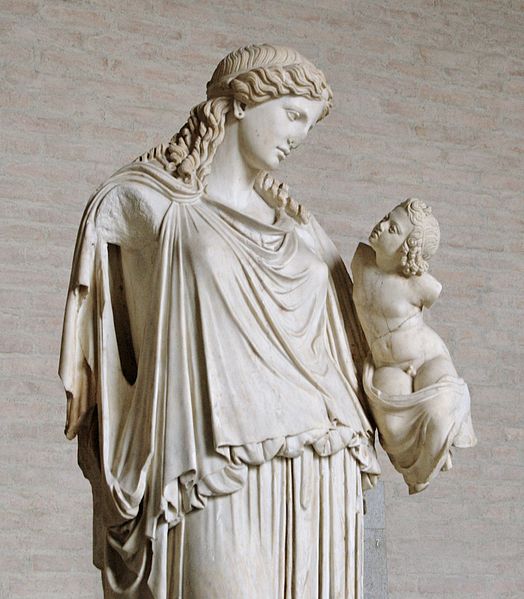
She was particularly well regarded by the
citizens of Athens
. After a naval victory over
Sparta
in 375 BC, the Athenians established a
cult for Eirene, erecting
altars
to her. They held an annual state
sacrifice to her after 371 BC to commemorate the
Common Peace
of that year and set up a votive
statue in her honour in the
Agora of Athens
. The statue was executed in
bronze by
Cephisodotus the Elder
, likely the father or
uncle of the famous sculptor
Praxiteles
. It was acclaimed by the Athenians,
who depicted it on vases and coins.
Although the statue is now lost, it was copied in marble by the Romans; one
of the best surviving copies (right) is in the
Munich
Glyptothek
. It depicts the goddess carrying a
child with her left arm –
Ploutos
, the god of plenty and son of
Demeter
, the goddess of agriculture. Eirene’s
missing right hand once held a sceptre. She is shown gazing maternally at
Ploutos, who is looking back at her trustingly. The statue is an allegory for
Plenty (Ploutos) prospering under the protection of Peace (Eirene); it
constituted a public appeal to good sense. The copy in the Glyptothek was
originally in the collection of the
Villa Albani
in Rome but was looted and taken
to France by
Napoleon I
. Following Napoleon’s fall, the
statue was bought by
Ludwig I of Bavaria
.

In
Roman mythology
, Pax (Latin
for peace
) (her
Greek
equivalent was
Eirene
) was recognized as a
goddess
during the rule of
Augustus
. On the
Campus Martius
, she had a temple called the
Ara Pacis
, and another temple on the
Forum Pacis
. She was depicted in art with
olive
branches, a
cornucopia
and a scepter. There was a festival
in her honor on January 3. Daughter of
Jupiter
and
Iustitia
. Pax was often associated with spring.
Titus Aurelius Fulvus Boionius Arrius Antoninus (19 September 86 – 7
March 161), generally known in English as Antoninus Pius was
Roman emperor
from 138 to 161. He was the fourth of the
Five Good Emperors
 and a member of the and a member of the
Aurelii
. He
did not possess the
sobriquet
“Pius” until after
his accession to the throne. Almost certainly, he earned the name “Pius” because
he compelled the
Senate
to deify his adoptive father
Hadrian
; the
Historia Augusta
, however, suggests that he may have earned the name by
saving senators sentenced to death by Hadrian in his later years.
//
He was the son and only child of
Titus Aurelius Fulvus
,
consul
in 89
whose family came from
Nemausus
(modern Nîmes
)
and was born near
Lanuvium
and his mother was Arria Fadilla. Antoninus’ father and paternal grandfather
died when he was young and he was raised by
Gnaeus Arrius Antoninus
, his maternal grandfather, a man of integrity and
culture and a friend of
Pliny the Younger
. His mother married to Publius Julius Lupus (a man of
consular rank),
Suffect
Consul
in 98, and bore him a daughter called Julia Fadilla.
As a private citizen between 110 and 115, he married Annia Galeria
Faustina the Elder
. They had a very happy marriage. She was the daughter of
consul
Marcus Annius Verus
and
Rupilia
Faustina (a half-sister to Roman Empress
Vibia
Sabina
). Faustina was a beautiful woman, renowned for her wisdom. She spent
her whole life caring for the poor and assisting the most disadvantaged Romans.
Having filled with more than usual success the offices of
quaestor
and praetor
,
he obtained the consulship in 120; he was next appointed by the Emperor
Hadrian
as
one of the four
proconsuls
to administer
Italia
, then greatly increased his reputation by his conduct as
proconsul
of
Asia
. He acquired much favor with the Emperor Hadrian, who adopted him as
his son and successor on 25 February, 138, after the death of his first adopted
son Lucius Aelius
, on the condition that Antoninus would in turn adopt Marcus
Annius Verus, the son of his wife’s brother, and Lucius, son of Aelius Verus,
who afterwards became the emperors
Marcus Aurelius
and
Lucius
Verus
(colleague of Marcus Aurelius).
Emperor
On his accession, Antoninus’ name became “Imperator Caesar Titus Aelius
Hadrianus Antoninus Augustus Pontifex Maximus”. One of his first acts as Emperor
was to persuade the
Senate
to grant divine honours to Hadrian, which they had at first refused; his efforts
to persuade the Senate to grant these honours is the most likely reason given
for his title of Pius (dutiful in affection; compare
pietas
). Two other reasons for this title are that he would support his
aged father-in-law with his hand at Senate meetings, and that he had saved those
men that Hadrian, during his period of ill-health, had condemned to death. He
built temples, theaters, and mausoleums, promoted the arts and sciences, and
bestowed honours and financial rewards upon the teachers of
rhetoric
and philosophy
.
In marked contrast to his predecessors
Trajan
and
Hadrian
,
Antoninus was not a military man. One modern scholar has written “It is almost
certain not only that at no time in his life did he ever see, let alone command,
a Roman army, but that, throughout the twenty-three years of his reign, he never
went within five hundred miles of a legion”.[2]
His reign was the most peaceful in the entire history of the
Principate
;
while there were several military disturbances throughout the Empire in his
time, in Mauretania
,
Iudaea
, and amongst the
Brigantes
in Britannia
, none of them are considered serious. The unrest in Britannia is
believed to have led to the construction of the
Antonine Wall
from the
Firth of Forth
to the
Firth of Clyde
, although it was soon abandoned. He was virtually unique
among emperors in that he dealt with these crises without leaving Italy once
during his reign, but instead dealt with provincial matters of war and peace
through their governors or through imperial letters to the cities such as
Ephesus (of which some were publicly displayed). This style of government was
highly praised by his contemporaries and by later generations.
Of the public transactions of this period we have scant information, but, to
judge by what we possess, those twenty-two years were not remarkably eventful in
comparison to those before and after his; the surviving evidence is not complete
enough to determine whether we should interpret, with older scholars, that he
wisely curtailed the activities of the Roman Empire to a careful minimum, or
perhaps that he was uninterested in events away from Rome and
Italy
and his
inaction contributed to the pressing troubles that faced not only Marcus
Aurelius but also the emperors of the third century. German historian Ernst
Kornemann has had it in his Römische Geschichte [2 vols., ed. by H. Bengtson,
Stuttgart 1954] that the reign of Antoninus comprised “a succession of grossly
wasted opportunities,” given the upheavals that were to come. There is more to
this argument, given that the Parthians in the East were themselves soon to make
no small amount of mischief after Antoninus’ passing. Kornemann’s brief is that
Antoninus might have waged preventive wars to head off these outsiders.
Scholars place Antoninus Pius as the leading candidate for fulfilling the
role as a friend of Rabbi
Judah
the Prince
. According to the
Talmud
(Avodah
Zarah 10a-b), Rabbi Judah was very wealthy and greatly revered in Rome. He had a
close friendship with “Antoninus”, possibly Antoninus Pius,
who would consult Rabbi Judah on various worldly and spiritual matters.
After the longest reign since Augustus (surpassing
Tiberius
by
a couple of months), Antoninus died of fever at
Lorium
in
Etruria
,
about twelve miles (19 km) from Rome, on 7 March 161, giving the keynote to his
life in the last word that he uttered when the
tribune
of
the night-watch came to ask the password—”aequanimitas” (equanimity). His body
was placed in
Hadrian’s mausoleum
, a
column
was dedicated to him on the
Campus Martius
, and the
temple
he had built in the Forum in 141 to his deified wife Faustina was
rededicated to the deified Faustina and the deified Antoninus.
Historiography
The only account of his life handed down to us is that of the
Augustan History
, an unreliable and mostly fabricated work. Antoninus is
unique among Roman emperors in that he has no other biographies. Historians have
therefore turned to public records for what details we know.
In
later scholarship
Antoninus in many ways was the ideal of the landed gentleman praised not only
by ancient Romans, but also by later scholars of classical history, such as
Edward Gibbon
or the author of the article on Antoninus Pius in the ninth
edition of the
Encyclopedia Britannicaca:
A few months afterwards, on Hadrian’s death, he was enthusiastically
welcomed to the throne by the Roman people, who, for once, were not
disappointed in their anticipation of a happy reign. For Antoninus came
to his new office with simple tastes, kindly disposition, extensive
experience, a well-trained intelligence and the sincerest desire for the
welfare of his subjects. Instead of plundering to support his
prodigality, he emptied his private treasury to assist distressed
provinces and cities, and everywhere exercised rigid economy (hence the
nickname κυμινοπριστης “cummin-splitter”). Instead of exaggerating into
treason whatever was susceptible of unfavorable interpretation, he
spurned the very conspiracies that were formed against him into
opportunities for demonstrating his clemency. Instead of stirring up
persecution against the Christians, he extended to them the strong hand
of his protection throughout the empire. Rather than give occasion to
that oppression which he regarded as inseparable from an emperor’s
progress through his dominions, he was content to spend all the years of
his reign in Rome, or its neighborhood.
|








 and a member of the
and a member of the